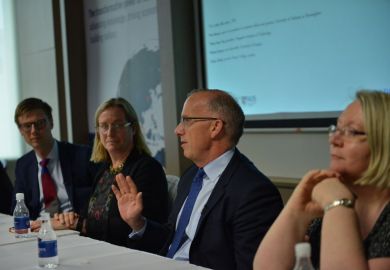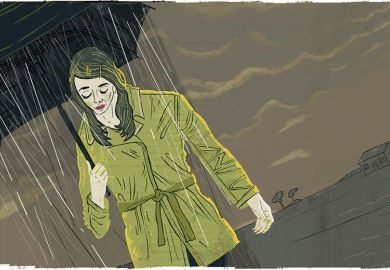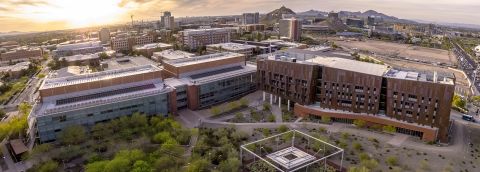It is a truism to note that the world is changing rapidly. Global warming, population growth and the rise of artificial intelligence and robotics are only some of the more obvious phenomena set to transform society over the coming decades.
It is equally commonplace to note that mitigating these challenges is likely to require the collaboration of multiple academic disciplines. Artificial intelligence, for instance, raises a host of issues not only in computer science but also in law, ethics and social policy.
For this reason, research has become much more interdisciplinary in recent years, with many universities and funders reorientating researchers along thematic rather than disciplinary lines, enlisting them on a range of “grand challenges”.
Yet, so far, the interdisciplinary spirit has typically penetrated less deeply into teaching. That is despite the fact that artificial intelligence is expected to take over many roles that have traditionally been regarded as graduate careers – and will potentially lead to the creation of new careers, as yet unforeseeable. With knowledge also available instantly via the internet, the students of the future are expected to require a flexible range of transferable problem-solving skills if they are to retain a foothold in such a fluid employment environment. And many experts consider that this will require undergraduate teaching to become much broader than has traditionally been the case in most countries.
The idea of students studying more than one subject is not new, but major moves in that direction remain relatively scarce. The UK is a case in point. While Scotland’s four-year undergraduate degrees have always embraced an element of breadth in their early years, those in England, which generally run for only three years, typically remain resolutely monodisciplinary. Joint honours degrees have been offered for decades, but the number of students taking them, far from increasing, is actually in steep decline, falling from 118,300 in 2007-08 to just 38,640 in 2016-17, a drop of 67 per cent, according to Universities UK’s recent Patterns and Trends in UK Higher Education 2018 report.
Moreover, Zahir Irani, dean of the Faculty of Management, Law and Social Sciences at the University of Bradford, believes that traditional UK joint honours degrees were “not thought through properly”. The two halves were merely “bolted together and too unconnected”, he says, because the two departments involved had little interaction with each other.
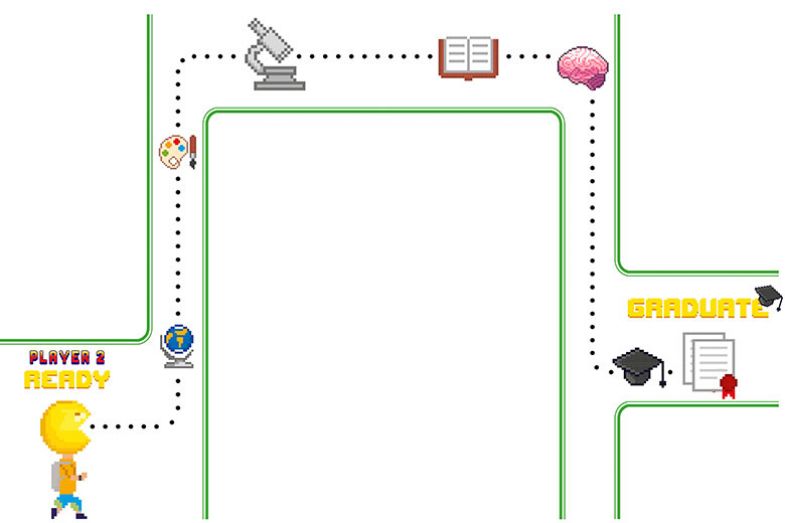
Irani believes that a better approach is to do away with siloed departments. His faculty will, instead, be loosely structured according to the increasingly interdisciplinary research it does – which students are keen to tap into. “There’s no point doing research if it doesn’t impact the curriculum,” he says. “I want to see that symmetry and alignment. It will have an interesting impact on pedagogy: rather than one person delivering one module, it will be a team-teaching approach.”
Andy Zieleniec, a lecturer in sociology at Keele University, notes that “in the world that many of us grew up in, you became a specialist in one thing and you had a job for life. Increasingly, most people don’t have that security.” Instead, employers are “looking for people who have that critical approach as well as flexibility and comfort in being able to work with different people from a range of backgrounds or disciplines, to come up with a range of different solutions. Students in the workforce will be constantly challenged with the need for new skills and be forced to tackle new problems…We want our students to recognise what it takes to build those skills, and have the confidence to know they can do it.”
For decades, Keele blazed a trail for joint honours. The university was founded in 1949 with a commitment to “equipping the work force for new industrial societal challenges for the future” and, until the 1990s, most of its students were encouraged to study two honours subjects. Although that tradition subsequently fell by the wayside, the university recently decided to reconnect with its cross-disciplinary roots by reviving another of its traditions: the foundation year. This offers undergraduates the opportunity to undertake broad-based interdisciplinary study in their initial year, before embarking on a standard three-year bachelor’s degree.
Rafe Hallett, director of the Keele Institute for Innovation and Teaching Excellence, says the institution is also committed to ensuring that most degree programmes offer opportunities for students to pursue elective courses, unless the demands of professional accreditation prevent it. These electives, though, are not random add-ons: they are packaged into interdisciplinary themes, such as digital futures or sustainability.
In April, Keele will even host a conference on interdisciplinary teaching and learning – although Hallett concedes that it does not have a monopoly on the concept in the UK: he points to UCL and the universities of Manchester and Leeds as institutions that have also taken steps in a similar direction.
“There’s a real trend in the UK to repackage disciplines in a way that will appeal to students who are interested in issue- or theme-based learning: that’s the real crux of this,” he says. “It’s not a betrayal of disciplines but a move beyond them.”
Three years ago, for instance, Keele launched a liberal arts programme. Students study theories, methods and perspective across a range of humanities and sciences, according to Zieleniec, who is the programme director. Of course, liberal arts degrees have a very long tradition in the US, but Zieleniec says that while US students are typically required to specialise in a specific major and minor during their later years, at Keele liberal arts is a degree in its own right, half of whose curriculum is made up of core modules and the other half with electives of the student’s choice.
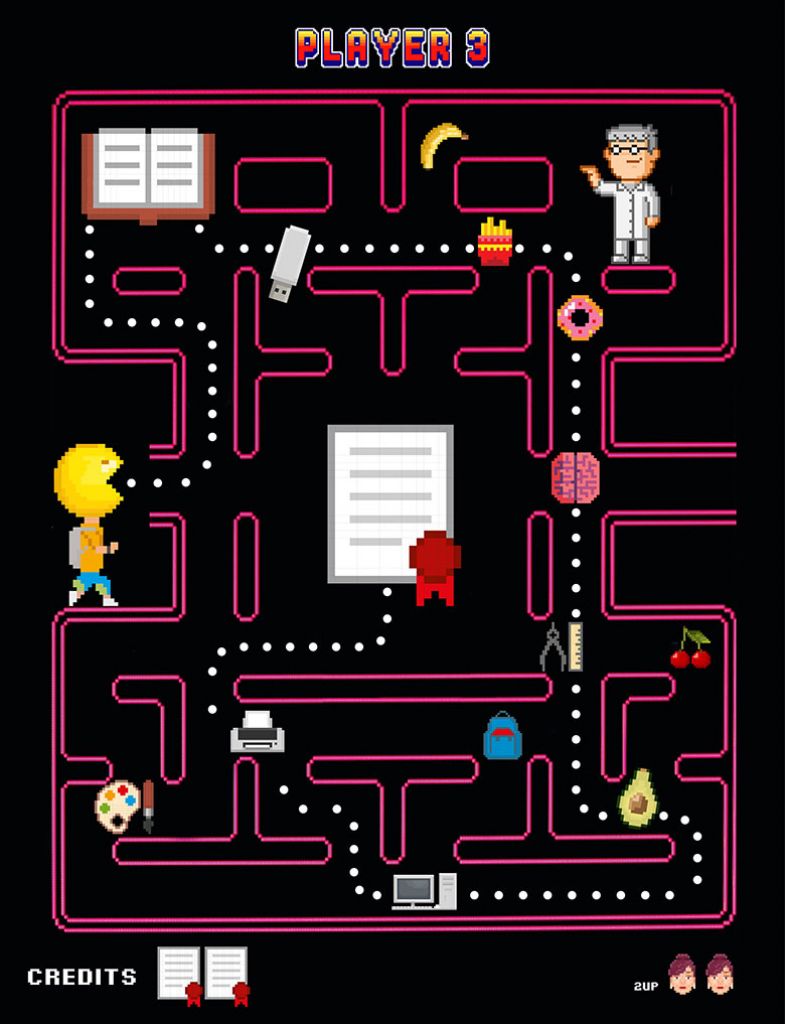
Liberal arts approaches are beginning to be adopted in Asia, too. India has recently seen several liberal arts universities established, while, in 2011, the National University of Singapore teamed up with Yale University to open the Yale-NUS College in the city state.
Nancy Gleason, director of the college’s Centre for Teaching and Learning, argues that traditional academic disciplines are not suited to “the cognitive challenges of the fourth industrial revolution at undergraduate level”.
In the foreword to a book she edited last year, Higher Education in the Era of the Fourth Industrial Revolution (by which term is meant primarily the rise of artificial intelligence), she writes that the well-paying jobs of the future will not only be in the areas of data analytics and cyber security, but also those demanding creativity and critical thinking. Hence, “the response…should be a combination of liberal arts education and upskilling depending on where you are in your educational journey”, she writes.
Interdisciplinary teaching is about acquiring not only a wider knowledge base, Gleason tells Times Higher Education, but also an ability to work with people from other disciplines, and to understand that they approach problems in a different way. For example, graduates employed in the games industry will work not only with computer scientists and programmers but with the artists, psychologists and other social scientists who will all collaborate on the creation of the games’ artificial worlds. A wide grasp of research method will also help citizens distinguish fake news from plausible claims, she adds.
Equally, though, it is likely to become increasingly important for students in non-technical subjects to acquire IT skills. The National University of Singapore announced last year, for instance, that all of its students will be required to study statistics and programming, regardless of their major.
But, in Gleason’s view, higher education’s response to the fourth industrial revolution has so far been “slow and inadequate” – albeit with some notable exceptions.
One of those exceptions might be Arizona State University. Sethuraman Panchanathan, chief research and innovation officer at the institution, agrees, for instance, that “technology and science students should have a lot more appreciation…of what it means to work in the area of humanities and social sciences”. Students trained in an interdisciplinary way will also be better able to play a fruitful part in multidisciplinary research efforts to tackle grand challenges, he adds. To this end, he has replaced the university’s traditional departments with “transdisciplinary schools”, which encourage their students to engage with multiple disciplines.
“Take the School of the Future of Innovation in Society,” he says. “It has faculty members from engineering, policy, business, sustainability…so when a student is a major in a school like that, he or she is embedded in an environment of different disciplines.” The absorption of a range of disciplines into a single programme in this way may also help to overcome one salient criticism of the traditional US major-minor model: that the collection of course credits that students are required to accumulate often lack intellectual coherence and fail even to add up to the sum of their parts, never mind surpass them.
But the US model lends itself more obviously than the UK model to interdisciplinarity and has its echoes in the “ Melbourne model” introduced into Australia in 2008 by the University of Melbourne and since imitated by the University of Western Australia. Melbourne replaced nearly 100 undergraduate courses with just six programmes: arts, biomedicine, commerce, design, music and science. A quarter of students’ time is taken up on “breadth” subjects outside their core subject areas, with professional specialisation reserved, as in the US, for graduate school.
More recently, the University of Sydney has also moved to broaden its own offering, launching a major and minor model in 2018 – although retaining vocational degrees such as engineering, law and medicine at undergraduate level.
Combined degrees and double majors are also being offered at Sydney, as are projects with industry partners and short, stand-alone courses offering what Sydney’s website describes as “foundational knowledge in areas such as design thinking, data analysis, ethics, leadership, programming and cultural competency”. The aim, it says, is that every Sydney student “will complete their bachelor degree with the confidence and ability to think critically, collaborate productively and influence the world” in recognition of the fact that “the next generation of workers is expected to change careers at least seven times in their lives, and about 35 percent of the skills needed today will be different in five years, according to the World Economic Forum”.
Pip Pattison, deputy vice-chancellor (education) at Sydney, tells THE that the university “came to the conclusion that although students need a strong and rigorous grounding in a primary field of study, there’s enormous benefit in gaining expertise in another. This means that they are more agile and better able to take on new perspectives and methods later in life.”
She also acknowledges the connections between interdisciplinary teaching and interdisciplinary research: “We really think it’s important for this kind of approach to happen in a research intensive setting like ours because we see the excitement around interdisciplinary research as something that can inspire students, while also passing on the value of working across disciplines. On the teaching side, it encourages staff to articulate and work through the nature of their own expertise and the nature of their discovery, while thinking about the broader societal and commercial implications of it.”
Other universities have begun efforts to structure their teaching as well as their research around certain grand challenges. For example, the Chinese University of Hong Kong is focused on translational medicine, China studies, sustainability and information and automation technology. However, such challenges often lend themselves much more clearly to some disciplines than to others. Michael O’Sullivan, associate professor of English literature and language at the institution, says that his department has struggled to find its place in this picture. Nevertheless, the department has still been pushed to broaden out its teaching to make it more relevant to the careers that its graduates might pursue. For example, O’Sullivan, whose specialism is modernist and Irish literature, is now teaching a course on graphic novels, in light of the career options in industries such as animation.
However, he is conscious of a risk that the department could spread itself too thinly: “If teachers just do interdisciplinary all the time they might lose their specialism.”
A similar concern also applies to the students themselves. Universities are typically thought of as places where undergraduates get the opportunity to dig deeply into a subject: by giving more priority to breadth at the expense of depth, is there a risk of making them jacks of all trades but masters of none?
Arizona State’s Panchanathan responds by noting that there is a big distinction between unrealistic attempts to make students experts in a number of disciplines and giving them “exposure to the importance of interdisciplinary thinking”. He accepts that students should continue to have a disciplinary focus, so they “are not sacrificing disciplinary expertise, but augmenting it”.
Keele’s Hallett also acknowledges the danger that too much interdisciplinarity would lack intellectual coherence. That is why Keele has instituted “pathways” – along which personal tutors are expected to guide their students – rather than a pick-and-mix free-for-all. Students are required to complete their final-year dissertation or project in their core discipline, while also bringing the interdisciplinary approaches they have learned into it. “We still need to train students in the conventions of a discipline – to the UK’s Quality Assurance Agency’s standard of a discipline – while also looking at others,” Hallett says.
Simon Fokt, a learning technologist at the University of Edinburgh, is also aware of the perils of allowing students to mix and match their education. But his concern is that students’ choices can be too narrow. One of the most exciting things about being an undergraduate, he says, is being confronted by a whole new world of knowledge – including previously unknown subjects. If students instead come to university with a definite idea of what they want to learn and are permitted to curate their own curricula, the window for such discovery is much smaller, Fokt worries.
This is a particular issue in online education, he says, because “there’s only so much you can fit in to these bitesize chunks they are given in – whereas interdisciplinary learning requires you to have a bit more time to explore the connections between the disciplines”. Students’ interest in exploring such connections, he says, can be minimal if they see education merely as a means to a relatively short-term employment end.
On the other hand, while interdisciplinary teaching might be key to ensuring that today’s graduates remain employable for the next four or five decades, Hallett believes that its appeal to undergraduates is often less worldly than that: “Saying ‘we’ll prepare you to solve or deal with societal challenges’ is very attractive to students,” he says. “Rather than saying ‘you’ll leave with competencies that [professional services firm] Deloitte likes’, we say ‘you’ll leave being able to contribute to ethical, moral or societal challenges’, which is more attractive to an 18-year-old today than the notion of having what employers want.”
One issue for universities that want to embrace cross-disciplinary teaching is that it can be tricky to get academics to break out of the disciplines they have spent their whole careers working within.
O’Sullivan admits that “there has been some conflict” within his department at the Chinese University of Hong Kong over the requirement for academics to broaden their curriculum beyond literary standards. “Some people feel that English should be taught to the canon,” he says. And he agrees that “there has to be a balance as we need to maintain our reputation as an English literature and linguistics department”.
For Hallett, the key is to challenge the mindset that “your discipline is your territory to be protected”. One way to do that is to emphasise the inherent intellectual interest of being “open to challenges from other disciplines about how you might address knowledge. It takes courage to put your discipline under the spotlight but if that’s done well then students feel they are part of a really live debate about these issues.”
That debate, Hallett says, can be catalysed if university teachers are involved in interdisciplinary research into grand challenges: “When tackling an issue such as sustainability, we know that it’s useful to have the perspective from natural sciences, business and enterprise, politics and others – all the things that might affect how sustainability is understood. Collaboratively taught modules and programmes are the natural output of that work.”
For this reason, Hallett continues, universities looking to introduce interdisciplinary teaching should begin their search for pioneers in their existing research institutes and clusters, where “you are more likely to find people who are working together with colleagues from different disciplines. When it comes to research-led education, the challenge is to make the vibrancy of those institutes work in relation to curriculum design, so you don’t just go back to the disciplinary pathways when you are teaching.”
Pattinson emphasises that Sydney’s radical reform of its undergraduate curriculum has not been straightforward: “You can only really have the whole university rethink its curriculum every 50 to 100 years.” But the university “listened to our stakeholders and what the research says about what it takes to build broader skills, what students say they want in an educational experience, and what the labour market says it wants in graduates. Luckily, all of these things are actually very well aligned and it was pretty clear what the core requirements were.”
Most Sydney staff have been supportive of the changes. “But they certainly did not want interference in the way they teach their core expertise, so we did not tamper with that,” Pattinson says. “What we did was really to restructure the whole thing at a macro level.”
Meanwhile, Panchanathan’s experience at Arizona State has convinced him that those seeking widespread institutional buy-in need to do more than just communicate the inherent value of interdisciplinary teaching and research. “The important thing, if you want faculty to work across disciplines, is that you have to recognise them for doing so,” he says. “You need to reward them to do it, such as through their tenure or promotion [criteria]. Then, once you embed [interdisciplinarity] into the faculty, the students will embed it, too.”
POSTSCRIPT:
Print headline: Ready player 1
Register to continue
Why register?
- Registration is free and only takes a moment
- Once registered, you can read 3 articles a month
- Sign up for our newsletter
Subscribe
Or subscribe for unlimited access to:
- Unlimited access to news, views, insights & reviews
- Digital editions
- Digital access to THE’s university and college rankings analysis
Already registered or a current subscriber?



